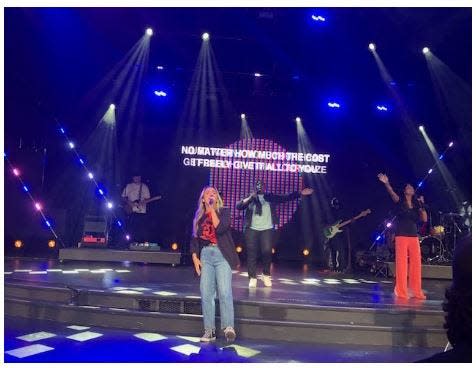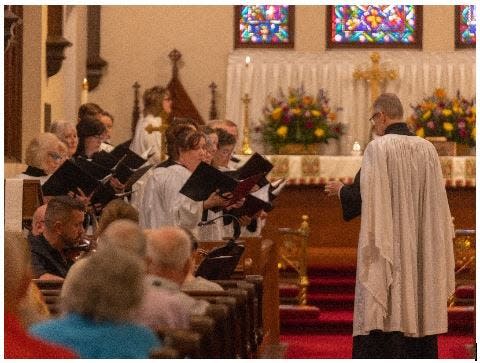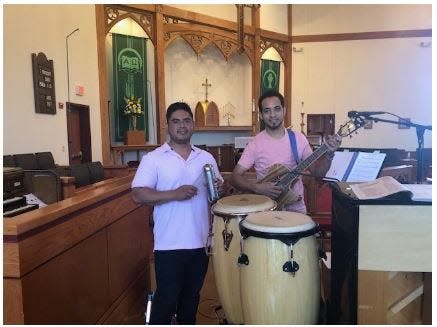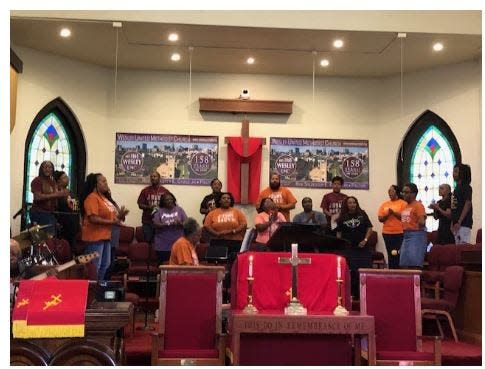Faith: Sounds of the faithful resonate in the Live Music Capital of the World

If Austin is known as the Live Music Capital of the World, is it also known as the Live Sacred Music Capital of the World?
God is the best person to answer that question, but I wanted to do some research. After all these eons, God’s playlist extends far beyond the lifespan of one human, let alone one generation, or 1,000 years.
Considering the primary Abrahamic, monotheistic religions of Islam, Judaism, Christianity and Baha’i Faith, God has been listening to music for nearly 4,000 years. That’s a lot of tunes. I wonder if God has a preferred century, 1500 vs. 2000, or a preferred decade, 1970's vs. 2020's for that matter. Which style would God choose?
The first music directed to the monotheistic God was likely offered by Jews circa 1800 BCE. Psalms were sung with musical accompaniment of instruments such as the shofar (ram’s horn), tambourines, cymbals, bells, trumpets, reeds and lyre.
Early Christian services about 2000 years ago modeled Jewish synagogue services. As Christianity grew, the liturgy and music evolved to the Gregorian chant, where every word in the service was sung. Instruments were not allowed.
Around 1600, harmony entered into the churches. The organ worked its way into the liturgy. Music became controversial. The early bishops and fathers were suspicious of musical instruments and believed they were pagan.
During the reformation, Catholics, Calvinists and Lutherans adopted different views about music. This debate continues today. Some churches oppose use of musical instruments, others embrace them.
The start of Islam is marked as the year 610. In mosques the Quranic recitation called Tajweed is used to recite the prayers. Generally, instruments are not allowed in mosques.
The youngest Abrahamic religion is Baha’i Faith that began in Iraq in 1844. The Baha’i teachings say that “God made music as a ladder for your souls.” Musical instruments are encouraged in devotions.
Of these religions, it’s safe to say that the music in the Christian church has changed most dramatically. From Gregorian chant without instruments, to songs accompanied by giant pipe organs, from Baptist hymns to rock 'n' roll, from a cappella to full orchestras, God’s playlist has changed dramatically during the eons. Can Austin claim to be the Live Sacred Music Capital of the World? Only one way to find out, I decided to go on a field trip.
First stop, I checked in with some Episcopal churches. I typically attend the yearly jazz mass at St. James Episcopal Church. The jazz trio, with a sax, of course, played a tribute to John Coltrane.

In addition to its English service, St. John’s Episcopal Church leads a Spanish service at 1 p.m. on Sundays. Two young men, a guitarist and a percussionist who played the congas and the shakers, accompanied the congregation as they sang and clapped along to Spanish songs of praise.
All Saints Episcopal Church’s music program includes an adult choir and bell choir. This year at the annual Choral Mass, the choir and string orchestra performed the "Little Organ Mass" by Franz Joseph Haydn with Gregory Eaton conducting the choir and chamber orchestra. The parish choir has Choral Evensong monthly on most of the last Sundays of the month.
“When I came to Austin, because of its Live Music Capital reputation, I expected to hear lots of pop, rock and country music, but I didn’t expect the city to have such a large classical music community," Eaton said.

Next stop, Shoreline Church North. The band was already jamming when I entered. They played praise music with the lyrics projected on Alamo Drafthouse-sized movie screens. The musical style was what I would call Christian rock. None of the songs were out of my old Baptist hymnal. Lights flashed on the stage as an octet of blue-jeaned singers sang accompanied by a drummer, guitarist and keyboardist. The show was live-streamed with videographers running about the auditorium as if it was a Rolling Stones concert.
I ventured over to the eastside to hear the choir at Wesley United Methodist Church. This historic church was started after the Emancipation proclamation in 1865. I heard its choir previously when the Intergenerational Choir of Wesley sang at Ann Richard’s memorial.
The New Generation Choir opened the service I attended and didn’t disappoint. The music pulled me back into the gospel tent at the New Orlean’s Jazz Fest. The congregation actively participated in the singing with clapping and "hallelujahs." A guitarist, pianist, drummer and organist accompanied the choir. Janice Jean, director of the New Generational Choir and children’s choir, said their church music includes a variety of traditional hymns, gospel, spiritual and contemporary music. Wesley United Methodist will hold its annual choir concert 4 p.m. Sept. 24.

On Friday night, I attended the Jewish Shabbat at Congregation Beth Israel. I was surprised to hear that most of the service involved singing accompanied by guitar and piano. “Psalms are always sung in the synagogue,” said Cantorial Soloist Sarah Avner. (This is not the case in all Christian churches.) Their songs are a mix of contemporary and traditional music, she said. Most synagogues except Orthodox use instruments in their services, however, all congregations blow the shofar on Rosh Hashanah and other holy days.
Avner explained that traditional Jewish music is difficult to define because Jews became global wanderers. Out of necessity, Jewish people incorporated foreign elements into the Jewish mainstream. Avner said she strives to match the music in the service to the specific traditions of her congregation. “Coming to the services should feel like putting on your favorite sweater so that melodies are familiar to your traditions," she said.
Also on a Friday, I visited North Austin Muslim Community Center for prayers. Though most of the service was silent, I did hear the melodic chanting of what I later learned was Tajweed. I spoke to Lila Aosseym, a woman who attended the prayers. She explained that the melodic voice-only recitation of the Quran, the Tajweed, is a traditional and artistic way of reciting the Quranic verses with proper pronunciation, rhythm and intonation. Aosseym clicked on her iPhone and played more Tajweed music for me. The sacred sounds of the prayers filling the mosque surely are pleasing to Allah.
Last stop, Baha’i Faith Center for devotions. In keeping with Baha’i tradition, music was an important component of the devotions. Though the music was shown on a video during my visit, the center's leaders do use instruments. The songs sounded like a Seals and Crofts album, in fact, the duo is part of the Baha’i faith community. Their hit “Hummingbird” is inspired by Baha’i writings.
Nabil Yazdami from the center stated, “Most Baha’i music uses the writings of the faith as its lyrics, although not required. Many songs are inspired by teachings of faith. The same song may be performed many different ways because the faith has roots in most every country in the world and puts high value on the unique culture of these places.”
My research included only a fraction of the music played in local worship venues. However, I’m confident more research will confirm, whether it is folk, rock, classical, contemporary, Gospel, Tajweed or Baha’i music, Austin has something for every believer.
Lacking any official capacity, I hereby declare Austin the Live Sacred Music Capital of the World. I hope you’ll check it out for yourself.
Diane Owens Prettyman is a writer and music lover. She is a parishioner at All Saints Episcopal Church and a member of their Central Texas Interfaith Core Team.
This article originally appeared on Austin American-Statesman: Music across different religions
